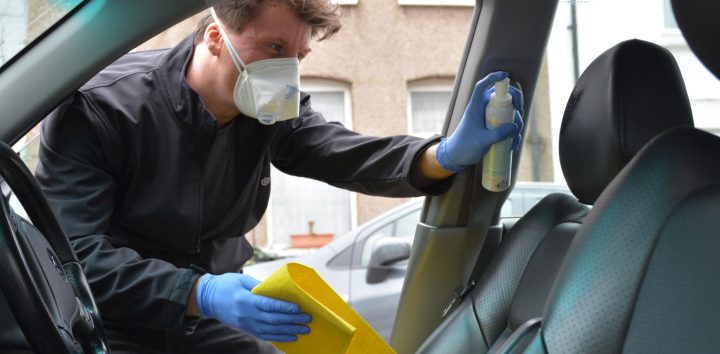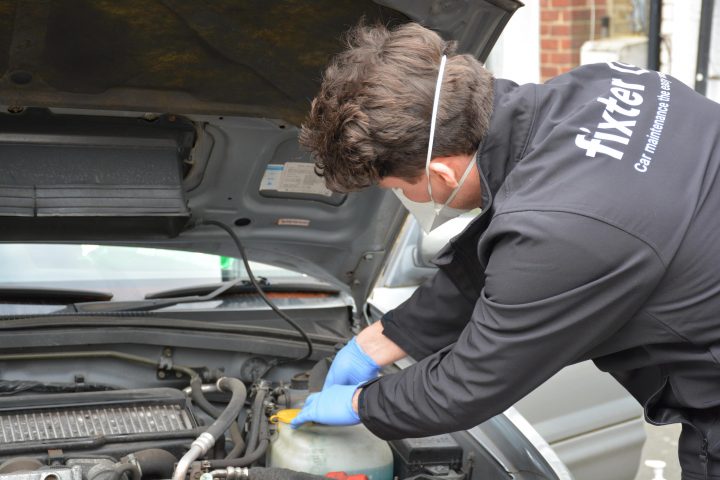Fixter, the UK’s first end-to-end online car maintenance service provider, is offering expert advice on its website – www.fixter.co.uk – to help all car users keep their vehicles hygienic during the ongoing lockdown.
Key points of the recommendations include the use of appropriate protective clothing to stay safe whilst cleaning a vehicle. Gloves are identified as an essential item in this case, but can become non-effective if not disposed properly immediately after finishing the sanitising process, or if people touch their faces while wearing them, say the Fixter experts.
Useful cleaning products, which can often be found at home, are also recommended by Fixter. For example, certified sanitising wipes and certain UV light treatments to eliminate virus traces are recommended for cleaning car interiors.
Whilst car owners are advised to wash their car interiors and exteriors thoroughly, Fixter recommends to avoid using too much water in the car, as it can cause mould and bad smells, especially if residue makes its way down the crevices of seats.
Fixter says it’s not usually necessary to go on a hunt for multiple specific cleaning products, all that’s needed is a bleach-free household disinfectant or even just soap, and a couple of bin liners.
However, avoiding bleach is important, as it may damage plastics and vinyl, while chlorine bleach can weaken the fabric of seat belts – so should not be used. Media screens, such as touch displays, may be affected by household glass cleaners, due to their anti-glare coatings. Normal soap and water is recommended as a better option.
Fixter advises to clean all possible touch points, inside and outside of the vehicle including:
- The driver area – (steering wheel; central console; levers and switches; internal door release) is important, as it is used the most
- Front passenger area – glove compartment inside and out; central console; levers and switches; internal door release
- Rear seats – cup holders; arm rests; switches; cabin lights; internal door release
- Seat belt clips – are often forgotten during the cleaning process. Parents doing up seat belts for children in the back could be at risk to spread the virus or bacteria in the process
- External car handles – are the first point of contact with any vehicle. The boot latch is especially important after a food shop, as most people don’t think about potentially transferring germs from the shopping cart handle to the latch of the car boot
- Bonnet – bonnet release; engine bay; oil cap; windscreen fluid cap and oil gauge
- Boot – internal release; parcel shelf and spare wheel compartment
- As the weather is getting warmer, electric window buttons, window handles and sunshades will be used more frequently, and should be added to the list
- Car keys – car keys are often attached to a key ring with multiple other important keys used daily and accumulate dirt, bacteria or viruses
In addition, Fixter experts recommend wearing robust gloves at petrol stations. The experts advise keeping a pair of latex gloves in the car at all times – therefore preparing drivers for petrol stations that have run out of gloves, or if the cheap and thin provided gloves split.
In a period of continually rising prices, one business is delivering potentially big savings and changing the way thousands of owners get their cars serviced.
It’s also giving an unexpected boost to hard pressed independent garages.
We are all accustomed to doorstep deliveries and collections and Fixter is what is nowadays termed a disruptor in the motor repair business.
Co-founder and chief executive officer (above) Limvirak Chea’s Fixter company essentially links independent garages with those who need work on their cars and offers guaranteed servicing and repairs between doorstep collection and return by an agent at times to suit the customer.
He started the business in Manchester in 2017 and enjoyed a 20% annual growth, moving into London, which is now his biggest location, and intends to continue developing his nationwide reach.
Fixter has reached South Wales with customers from Newport to Swansea and more are joining each month in Wales as it expands.
Hundreds of independent garages are signed up with Fixter and its services are used by thousands of car and van owners. Fixter inspects each garage before working with them and has a database of their abilities and services which it uses to match to customers’ requirements.
“The customers simply go on-line and make the booking and we do the rest,” said Limvirak. “We can collect from a person’s home or place of work, choose the best garage for the work and then return the vehicle.
“Prices are quoted before work starts and if a particular job reveals something else which needs to be done we inform the owner before to authorise the additional work.
“Owners can save 30% on normal franchised garage rates and all work is guaranteed with the collection and delivery insured by a prominent insurer.”
The independent garage sector has long been struggling to compete with franchised dealers and many have become specialists for particular brands. They have access to the necessary testing equipment and tools but they are not so widely known and Fixter is a potential lifeline to them.
In the current coronavirus lockdown, many garages have closed but others remain open and can work to social distancing rules which are enforced by Fixter agents so that owners don’t have to worry about social contact. If they are at home or work the motor repair is done while they don’t need the vehicle.
There is another current service Fixter provides and that is essential food or medicine deliveries for vulnerable or shielding people.
“We want to make it as easy as possible for our customers, to give work to independent garages and keep down costs in these difficult times,” he added.




